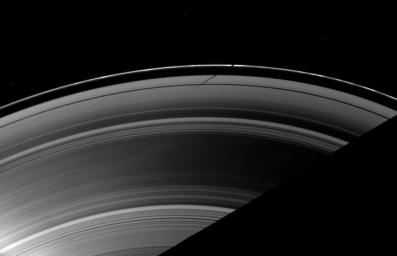The shadow of the moon Mimas strikes the F ring at a different angle than the angle at which it is cast on the A ring, illustrating differences in the vertical heights of the rings in this image taken as Saturn approaches its August 2009 equinox.
The novel illumination geometry that accompanies equinox lowers the sun's angle to the ringplane and causes out-of-plane structures to cast long shadows across the rings. These scenes are possible only during the few months before and after Saturn's equinox, which occurs only once in about 15 Earth years. To learn more about this special time and to see movies of moons' shadows moving across the rings, see PIA11651 and PIA11660.
Pan (28 kilometers, or 17 miles across) orbits in the Encke Gap and is visible on the left of the image. The brightness in the lower left of the image is lens flare, a radially extending artifact that results from light being scattered within the camera optics. The shadow of Saturn cuts across the lower right of the image. Two stars can be seen through the rings. Other bright spots in this image are also background stars.
This view looks toward the unilluminated side of the rings from about 52 degrees above the ringplane. The image was taken in visible light with the Cassini spacecraft wide-angle camera on June 15, 2009. The view was obtained at a distance of approximately 1.8 million kilometers (1.1 million miles) from Saturn and at a Sun-Saturn-spacecraft, or phase, angle of 90 degrees. Image scale is 103 kilometers (64 miles) per pixel.
The Cassini-Huygens mission is a cooperative project of NASA, the European Space Agency and the Italian Space Agency. The Jet Propulsion Laboratory, a division of the California Institute of Technology in Pasadena, manages the mission for NASA's Science Mission Directorate, Washington, D.C. The Cassini orbiter and its two onboard cameras were designed, developed and assembled at JPL. The imaging operations center is based at the Space Science Institute in Boulder, Colo.
For more information about the Cassini-Huygens mission visit http://saturn.jpl.nasa.gov/. The Cassini imaging team homepage is at http://ciclops.org.

 Planetary Data System
Planetary Data System












